Home » Jazz Articles » Interview » Kellylee Evans: A Nod to Nina, Then Onward
Kellylee Evans: A Nod to Nina, Then Onward
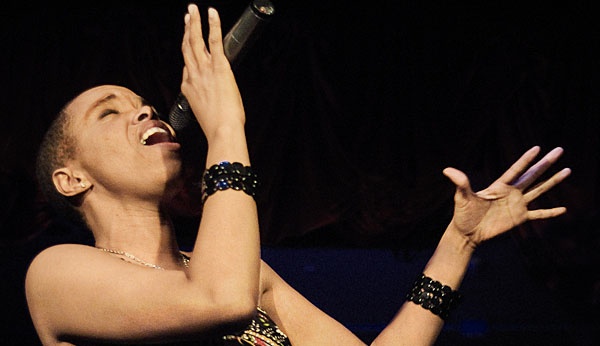
Almost dying made me realize me realize that I didn't want to spend any more time not doing what I wanted in life. So from that period on I started writing music and I started to make plans.
When the Toronto, Canada-area woman made a decision to drop pursuit of a master's degree to pursue singing—a decision made after a near-death experience—it wasn't long before she was working on her first recording, an album created with the aid of noted jazz bassist Lonnie Plaxico, and recorded in New York City. While that was going on in 2004, she entered the prestigious Thelonious Monk Institute Vocal Competition and came in second (Gretchen Parlato took first). All this from someone who didn't grow up listening to jazz. She was relatively late in developing an appreciation for the music, but her skills quickly adapted to it.
Evans doesn't plan to exclusively sing jazz, and in her writing and performing she is just as easily at home in pop, soul and R&B. She likes country music, too. But her latest CD is a group of songs associated with Nina Simone, aptly titled Nina (Plus Lion Music, 2010). It's a worthy tribute and could be the first in a series of recordings where she covers standards in various genres, paying tribute to the voices that came before hers.
Evans, now based in Ottawa, Canada, is a voice that blossomed onto the international music scene and is making some imprints in the jazz world, even though she eschews the "jazz singer" label. "I consider myself just a singer," she notes. "A singer/songwriter." There's no doubt she has the tools to play jazz clubs or festivals, thought she hasn't really done that yet. The Simone material will certainly boost those options.
"I like being able to feel free," she says. "It's a big deal to me to feel a sense of autonomy in the CDs that I make. To be able to choose my repertoire and to choose how I performed this last disc was important to me. To have that same autonomy for the next disc is a big deal." She adds, "I love so many different kinds of music. I'm pretty open."
She wrote all the music for her first two self-produced recordings: The Good Girl, which came out earlier in 2010, and Fight or Flight?, from 2007. Plus Lion, a French label, heard about Evans thought the Monk competition, and brought her into the studio in 2009.
Evans wasn't an immediate fan of Simone growing up, when she would have to continually put those records on for her mother. "I remember back then I was, like, 'Aw c'mon mom.' At that time I wanted to listen to Michael Jackson or Blondie. Pop music. [But] Listening got me closer to the music and her voice." Her boyfriend, now husband, was also a Simone fan. The constant exposure continued.
"She really grew on me and became part of my life. It wasn't long before I became a fan. So when they asked me to put together a CD of standards, right away I knew I wanted to do this project."
For Evans, the music strikes a strong nostalgic chord, as much as Simone's style. "She really sings with a lot of feeling and a lot of emotion. When I was listening to her, there were certain things happening in my life. So, for instance, when I think back to listening to her with my mom. My mom's passed on, so it reminds me of her. For me, music is like a touchstone to different periods of my life. Listening to her, as well, I can think about being a student at university, sharing an apartment with my boyfriend—my husband now—and it takes me back to that. And back to the time of my mom as well; it's more memory as opposed to what [Simone's] voice can do. It takes me back. And I love that."
 For Nina, Evans was joined by guitarist Marvin Sewell, Cassandra Wilson's musical director (Sewell also appeared on her inaugural CD), along with bassist Francois Moutin and drummer is André Ceccarelli.
For Nina, Evans was joined by guitarist Marvin Sewell, Cassandra Wilson's musical director (Sewell also appeared on her inaugural CD), along with bassist Francois Moutin and drummer is André Ceccarelli.Evans doesn't try to grab the in-your-face nature that could come out in the work of Simone, a noted civil rights activist. Rather than imitate, she brings her own presence to the material and the results are strong. Evans has a crystal clear voice and she enunciates precisely. Her full-bodied instrument is pliable enough for pop, soul, R&B and jazz. In jazz, she's not an explorer like, say Betty Carter or Cassandra Wilson. Nor was Simone. But Evans has a good sense of swing and enough melodic invention to address the jazz lexicon, and do so engagingly. She's a fan who discovered she has an affinity, and her musicality and vocal abilities allow her to glide into that realm. Her love of music propels her to approach jazz, enjoy it, express it and discover what she can do when her skills are applied. There is beauty that results.
 Tomorrow is My Turn" is a good example of Evans' feel for jazz. Like Simone's version, the song swings, and Evans is delightful in the way she phrases over the groove, a strong character to her voice. "Feeling Good" is impassioned soul, sparked by brief, but scorching, Sewell solo. "Sinnerman" is bluesier, with a good dose of soul. Her delivery even has touches of reggae, over sharp electric spears thrown by Sewell. It carries a Simone aura. "Wild is the Wind," the title cut to a 1964 Simone album on Verve, is a soulful torch song in which Evans is elegant. "Don't Let Me Be Misunderstood" has a lilting calypso feel, and Evans adroitly injects puts her sweet sound in just the right spots. Sewell adds a graceful, understated solo that matches the singer's mood.
Tomorrow is My Turn" is a good example of Evans' feel for jazz. Like Simone's version, the song swings, and Evans is delightful in the way she phrases over the groove, a strong character to her voice. "Feeling Good" is impassioned soul, sparked by brief, but scorching, Sewell solo. "Sinnerman" is bluesier, with a good dose of soul. Her delivery even has touches of reggae, over sharp electric spears thrown by Sewell. It carries a Simone aura. "Wild is the Wind," the title cut to a 1964 Simone album on Verve, is a soulful torch song in which Evans is elegant. "Don't Let Me Be Misunderstood" has a lilting calypso feel, and Evans adroitly injects puts her sweet sound in just the right spots. Sewell adds a graceful, understated solo that matches the singer's mood."I'm happy with it. It's good when you feel happy with your project," says Evans gleefully. "I feel good about recommending the CD. I don't feel like I have to make any excuses. When people say they like it, I'm happy. That's important. The cool thing about it, it didn't take a lot of time to come up with something that I'm proud of." She described Sewell as "awesome. Working in the studio with him was great. All the players that were involved had a really open and warm and generous way about them, so playing with them was very easy."
Adds the singer, "I always had in my mind a series of standard albums. So this is definitely just a start. I don't know what the next CD is going to be. I don't know if it's going to be standards or go back to writing. But I have to keep going. When you're a musician or creator, I think you have to keep doing something. Forward, forward, forward."
Moving forward with her career is exactly what she has done. But it started late. She reveals, "Right from the beginning I always knew it was something I wanted to do. It wasn't always something I was allowed to do. I had to focus on getting good grades." In her family, becoming a professional in music was impractical. "Be reasonable. Be rational," is what she heard. "It took me a while to get into music properly. I was 24."
She was always singing around the house, beginning at a young age, and loved it. "I was always known as a singer, so people would ask me to take part in different functions and be involved," she says, adding the caveat, "but that wasn't serious." She took some piano lessons, but never really learned to read music. At one point, she played some saxophone, "but once I got into grade eight, I didn't want to, because my grandmother was so strict about school, I didn't want to use a credit for music. So I used it for sciences and math and stuff. There was no feeling I was going to be a musician." She performed at various community shows and was a member of the Toronto Mendelssohn Youth Choir.
Evans went to Carleton University in Ottawa, where she earned a bachelor's degrees in both legal studies and English literature, and she wasn't taking any music courses. But there were opportunities. The university had a jazz orchestra and jazz combos. "And a choir," Evans says."I was involved in those after school even though I wasn't in the music program. They would let people from outside programs be involved. That was how I started in jazz. It was really cool and I had such a great time. But I couldn't take seriously because I was supposed to be doing my master's thesis. But instead of working on my thesis, I would be building my repertoire and learning about other singers. Trying to plan a gig here and there. I found that was more exciting than working on my thesis."
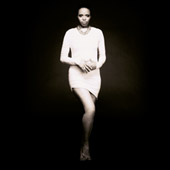 When she found jazz, and decided it was a challenge she wanted to take on among other styles of music, "I paid attention mainly to people who did standards and covers. So I loved Ella Fitzgerald and Sarah Vaughan, jazz singers like that. But I'm also hugely influenced by music from outside of the jazz medium. When I started to write, one of the biggest people who was instrumental was Abbey Lincoln. I loved everything about her work. She wrote a lot of originals; I started working on originals based on listening to her. She was the first singer/songwriter that I really started listening to in jazz."
When she found jazz, and decided it was a challenge she wanted to take on among other styles of music, "I paid attention mainly to people who did standards and covers. So I loved Ella Fitzgerald and Sarah Vaughan, jazz singers like that. But I'm also hugely influenced by music from outside of the jazz medium. When I started to write, one of the biggest people who was instrumental was Abbey Lincoln. I loved everything about her work. She wrote a lot of originals; I started working on originals based on listening to her. She was the first singer/songwriter that I really started listening to in jazz."Evans even participated in Jazzworks, a Canadian not-for-profit organization dedicated to the development of jazz musicianship in players and singers.
The transformation to singing was hastened by a pair of events. One was the death of her mother, who succumbed to cancer. Her effort to get a master's degree in legal studies, and write the necessary thesis, was becoming a grind. "I had a one year-old child and I was feeling stressed; I had ulcers, and I was just feeling horrible. Finally, I decided to drop out. It was like this big weight was lifted from my shoulders. I started to think about what life would be like if I wasn't in school, because I'd been in school for 20 years."
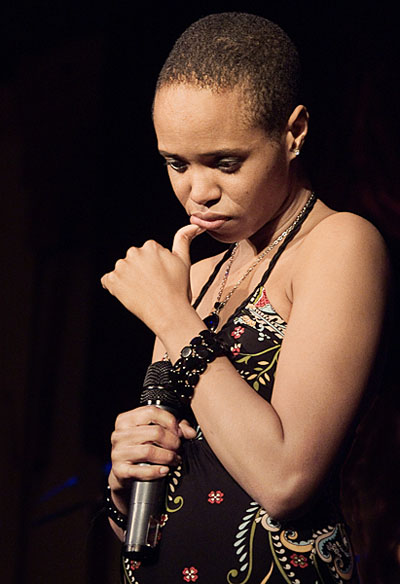 She decided to take up the sport of tennis when she sustained an ankle injury. At the hospital emergency room, "they gave me a prescription and I was allergic to it. I almost passed away. I went into epileptic shock." That had a profound impact.
She decided to take up the sport of tennis when she sustained an ankle injury. At the hospital emergency room, "they gave me a prescription and I was allergic to it. I almost passed away. I went into epileptic shock." That had a profound impact."Almost dying made me realize that life is really short," says Evans. "Watching my mom go before me. Seeing my daughter come into the world, and then almost losing my life was enough to make me realize that I didn't want to spend any more time not doing what I wanted in life. So from that period on I started writing music and I started to make plans. It was really easy from that period onward to stay motivated. This is what I'm doing. That's been life so far. I've really had a blast with this. I'm proud of the work I've been doing and I'm proud of still being here."
She started doing some local gigs, but not many. "I didn't have a CD. Finally, I made a little demo of about four songs; four standards. Things really started moving when I started writing and I decided to record a CD." She met Plaxico at the Ottawa Jazz Festival, where he was performing with Ravi Coltrane. "I talked to [Plaxico]. When I finished writing my music, I sent him some guitar and voice recordings. He said, 'Wow. This is great. Come and we'll put it together.' I told him who I wanted to work with. He tried to find them or people who were comparable. We made my first album over about four days in Manhattan. It was fun."
It was some of those original tunes for the first CD that she submitted to the Monk Institute for the competition. "We put together a CD. Then I heard about the Monk competition. I submitted some of the songs we recorded for the CD in the competition. That's how things started. I really went from very light gigging into a professional career very quickly," she notes.
At the Monk competition, in Washington, D.C., the judges were heavyweights: Kurt Elling, Jimmy Scott, Dee Dee Bridgewater, Al Jarreau, Flora Purim and Quincy Jones. "It was really exciting. I got to interact with a lot of the people I'd been listening to all my life. For instance, Kurt Elling. I'd grown up listening to Quincy Jones and people he's produced, whether it the jazz world or pop world. So to have him be one of the judges was a big deal for me. I wouldn't be anywhere without it."
She has been pushing her singing career ever since, as well as being a mother of three kids, whom she home schools. The first recording came out in 2007 and the second last February. She regrets not having more formal music training, but that's coming. "I go through periods where I try to learn again. But I haven't really buckled down. I've been learning French in the last little while. I'm realizing it's not as hard as I made it out to be. It's just a matter of buckling down and doing the work. It's the same with music. I just need to buckle down and do the work. One day I'll be a player too," she says chuckling in her typical fashion.
Formal training or not, she functions well in her chosen field. The Good Girl is not for pigeonholing into a genre. The songs come from Evans' personal vault. "I Don't Think I want to Know" is a cool, bluesy offering, while "How Can You Get Along Without Me?" is a softly swinging affair to which it's possible to imagine Billie Holiday taking a liking. "Who Knows" is soulful pop. This is not pop schlock.
As she grasped things from listening to Lincoln, "I left jazz and went more into writing popular songs. I think that's where I still am. This foray into performing the standards [Nina] has been really helpful. Just to get back to listening to other people's writings and singing other people's writings. It's been good because I think you can get into a pattern with your own work when you're just writing. Having to sing all these famous covers written by other people has been helpful in inspiring new music for me."
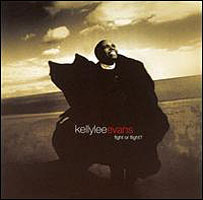 She adds, "I've had vocal inspiration and lyrical inspiration all over the place. I love listening to Coldplay. I love Jamie Cullum. I love Feist, a Canadian artist here. There are just so many artists out there. I listen to as much as I can. I also listen to a lot of children's music."
She adds, "I've had vocal inspiration and lyrical inspiration all over the place. I love listening to Coldplay. I love Jamie Cullum. I love Feist, a Canadian artist here. There are just so many artists out there. I listen to as much as I can. I also listen to a lot of children's music."Her only other regret is not having made a better business plan for her music career, since she switched gears so quickly. "If ever somebody came to me and asked me how to go about music, I would say be really smart about the money. That's how you get hurt. Figure out how to do as much as you can for the least amount [expenses]. Right away. Right off the top. Don't go into debt too much. You can do anything if you're not worried about where every dollar is coming from. There are a lot of smart people out there that keep their costs down from the beginning. That wasn't me. So I've got quite a lot to pay back. I don't regret music, I just regret not being a better business person."
Nonetheless, "I love music, so it's been pretty easy to keep going forward."
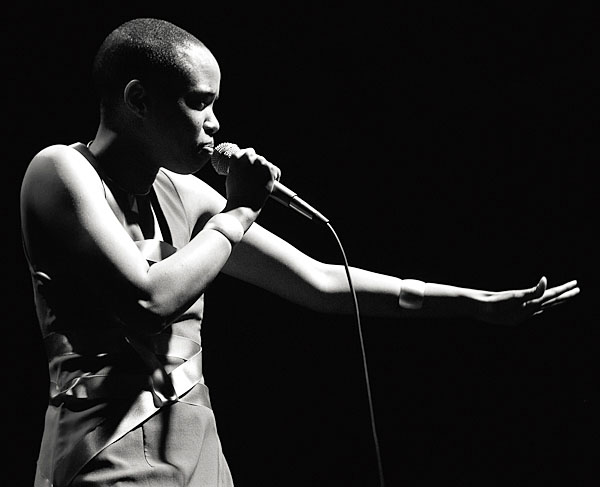
Kept busy at home with her children, Evans writes songs when she can carve out the time. "That's something I need to get to. I just haven't put the importance on writing as much as I have on all the other things that are important. When I do write, I cherish it."
Evans has done some performing in the U.S., but currently she says France is where things are moving and she recently returned from a performance at L'Olympia, in Paris, "which is an awesome venue. We go back again in February. It's great."
With the help of her family, she strives for the proper balance of career and home life. Expanding her career is important enough "so we make everything work with it. That's how mom stays sane," she says with a soft laugh. "I have to sing; I want to continue to travel and play to bigger and bigger audiences across the world. I love this job. I'm hopeful. I've got my fingers crossed. I love this."
Selected Discography
Kellylee Evans, Nina (Plus Lion, 2010)
Kellylee Evans, The Good Girl (Self Produced, 2010)
Kellylee Evans, Fight or Flight? (Self Produced, 2007)
Photo Credits
All Photos: Roger Humbert
< Previous
Smalls Jazz Club: Live and So Much More
Next >
Open
Comments
Tags
Kellylee Evans
Interview
R.J. DeLuke
Fully Altered Media
United States
Lonnie Plaxico
Thelonious Monk
Gretchen Parlato
Nina Simone
Michael Jackson
Marvin Sewell
Cassandra Wilson
Francois Moutin
Andre Ceccarelli
Betty Carter
Ella Fitzgerald
Sarah Vaughan
Abbey Lincoln
Ravi Coltrane
Kurt Elling
Jimmy Scott
Dee Dee Bridgewater
Al Jarreau
Flora Purim
Quincy Jones
Jamie Cullum
For the Love of Jazz
 All About Jazz has been a pillar of jazz since 1995, championing it as an art form and, more importantly, supporting the musicians who create it. Our enduring commitment has made "AAJ" one of the most culturally important websites of its kind, read by hundreds of thousands of fans, musicians and industry figures every month.
All About Jazz has been a pillar of jazz since 1995, championing it as an art form and, more importantly, supporting the musicians who create it. Our enduring commitment has made "AAJ" one of the most culturally important websites of its kind, read by hundreds of thousands of fans, musicians and industry figures every month.






















